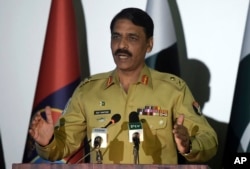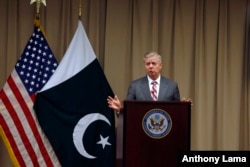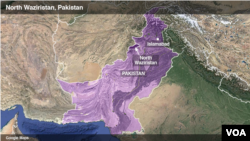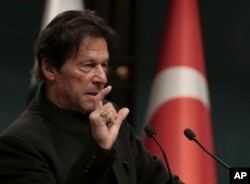Pakistan says a unilateral construction effort will have fenced off nearly half of its largely porous border with Afghanistan before the spring fighting season in the neighboring country. Military officials say the pace of the massive border security project has lately been accelerated to guard against a possible spill over of “terrorism” from Afghanistan in the event of a widely anticipated U.S. military drawdown there.
The military recently flew a group of journalists to the North Waziristan border district to showcase the installation of the pair of nine-foot chicken wire fences, with a six-foot gap, and topped with barbed wire along the nearly 2,600 kilometer Afghan border.
“(Almost) 900 kilometers has been completed and the remaining 300 kilometers, inshallah (God willing), we will be completing in two to three months time,” army spokesman Major-General Asif Ghafoor told reporters in Ghulam Khan, one of the several border crossings. “Thereafter, wishfully by the end of this year, or at best mid of next year, we will be able to compete the entire (2,600 km) fencing,” he said.
The fence runs along rugged terrain and snow-capped mountains as high as 12,000 feet. Additionally, hundreds of new forts and outposts have been established or are under construction, Ghafoor explained and estimated the unprecedented construction effort will cost about $500 million.
Pakistan has also stepped up political efforts to promote peace in the turmoil-hit neighboring country. Islamabad takes credit for convincing Taliban insurgents to come to the table and negotiate with the U.S. a peaceful settlement to the 17-year-old Afghan war.
General Ghafoor appeared cautiously optimistic about a positive outcome of the dialogue but said insecurity in Afghanistan will remain a challenge for neighboring countries.
“Our biggest worry now is the reconciliation is taking place in Afghanistan and it is going to be a mess whether Afghanistan is exited by the U.S. in an announced and organized way or abruptly. We are doing this fencing with speed we are doing development (in border districts) with speed. We will not let that thing (terrorism) come to Pakistan,” he vowed.
Ghafoor insisted the fence is strengthening Pakistani efforts to prevent cross-border terrorism from threatening security gains the country has made over the past decade. North Waziristan used to be known as the epicenter of international terrorism and a hub for the outlawed Pakistani Taliban. U.S. and Afghan officials have also long alleged Islamabad’s counterterrorism efforts ignored sanctuaries of the Afghan Taliban on its soil.
Pakistani officials deny those charges and assert years of military operations have dismantled terrorism structures in and around the Waziristan region, killing thousands of militants and forcing remnants to flee and take refuge in Afghan border areas. The army spokesman said that the militants continue to stage terrorist attacks against Pakistan but the fencing is helping to neutralize the threat.
“Attempts to physically infiltrate the border have been completely blocked In areas where have erected the fence. Fire raids at our posts from the other side are still continuing but inshallah (God willing), they will also come to an end after all the forts and an electronic surveillance system are in place. With the help of this fence, everyday we are gaining more strength to stop the terrorism from that side,” Ghafoor noted.
U.S. Praises Border Security Project
U.S. Sen. Lindsey Graham during his visit to Islamabad last month praised Pakistan’s border fencing effort and emphasized the need for a matching response from the Afghan side.
“There is a big debate about building a wall back home to make us safe. If you want to see somebody building a fence or wall come to Pakistan. The plan to secure the border on the Pakistani side is very robust,” the American senator noted.
Afghan Objections
Gen. Ghafoor called for the Afghan government to reciprocate and boost border security on their side to promote regional peace, though he acknowledged Afghan forces have capacity and manpower issues. Kabul has been critical of Islamabad’s border security measures because Afghanistan traditionally disputes the former British era demarcation called the Durand Line.
Pakistani officials dismiss the objections and insist their security measures on what they say is the international bounder with Afghanistan will help prevent terrorist infiltration in either direction.
“We have achieved peace in our country. But if the situation continues to be volatile and chaotic in Afghanistan we fear terrorism would hit back Pakistan. That’s what prompted us to begin fencing of our border. Only legal entry will be possible through dedicated terminals we are or have established at the border once we are able to install the fence along the entire boundary,” Ghafoor stated.
Waziristan Returns To Normalcy
Area commanders said that 95 percent of the more than a million tribesmen displaced by anti-militancy operations have returned to North Waziristan where new markets, roads and other facilities have been constructed or are under construction to help in their rehabilitation process.
Efforts are also under way, they said, to facilitate the repatriation of more than 4,000 families who fled to the Afghan side of the border just before the Pakistan military launched a major ground and air offensive against militant bases in Waziristan nearly five years ago.
Army officials also drove journalists around the district headquarters of Miran Shah and gave them free access to discuss with residents problems facing them while they try to resume normal life. Most of them acknowledged improvement in security conditions and infrastructure but demanded authorities restore cell phone services and address electricity outages.
“I am happy and feel safe. Reconstruction activities are underway. But that is not enough,” said Usman Wazir, a trader by profession who recently returned home with his family.
“We face electricity outages for the whole day. Our (cell) phones are not working and we don’t have finances to revive our businesses,” he lamented.
Generally, tribesmen appeared happy with the changed and relatively modern outlook of markets and roads in their areas but they demanded government pay urgent attention to rebuilding health and education facilities.
Border Security Hits Mutual Trade
The new tight border controls and visa restrictions have undermined Pakistan’s already mistrustful political relations with Afghanistan in recent years. It has also impacted negatively economic and trade ties between the neighbors. Around 60,000 people commute across the Pakistan-Afghanistan border on a daily basis. That cross-border movement continues and Pakistani officials promise things will improve further due to measures being taken to solidify bilateral ties in all fields.
Pakistani Prime Minister Imran Khan last week instructed government departments to take the necessary steps over the next six months so the main northwestern Torkham crossing with Afghanistan could be kept open 24 hours.
"This measure is a major step to promote bilateral trade and transit of goods between the two countries and also to facilitate enhanced people to people contacts. Pakistan will take more such steps to further solidify economic and trade relations as well as the strong bonds between the peoples of the two countries,” says Foreign Ministry spokesman Mohammad Faisal.
He noted that Pakistan remains the largest market for Afghan exports, receiving almost 60% of the neighboring country’s total exports, and estimated that Pakistan consumes 90% of Afghan fresh fruits and vegetables. Faisal said Islamabad waived off regulatory duties on fresh fruit imports from Afghanistan, leading to a 29% increase in Afghan exports to Pakistan.
Leaders in Kabul, however, remain skeptical and suspicious of Pakistani efforts toward peace building in Afghanistan. They continue to blame Islamabad for the prolonged deadly war in their country, charges officials in Pakistan maintain stem from simmering internal Afghan political disputes, insecurity, governance issues and rampant corruption that have emboldened the Taliban to take control of nearly half of Afghanistan.








